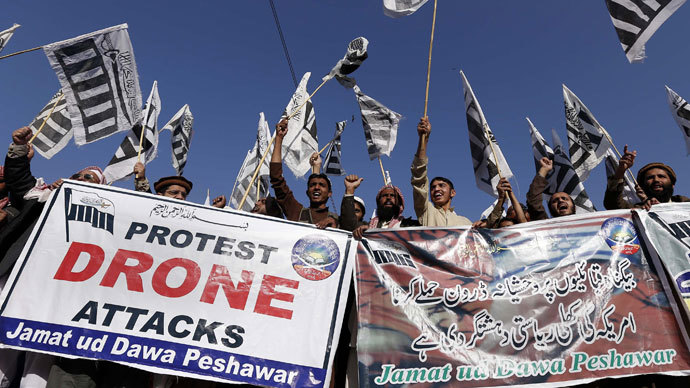The Pentagon has put the brakes on military cargo shipments traveling from Afghanistan to Pakistan, citing anti-drone protests that threatened truck drivers, a Pentagon spokesman said Tuesday.
The key supply route, which runs from the Torkham Gate border
crossing, has been the scene of protests aimed at the US drone
campaign in Pakistan that has killed and injured hundreds of
innocent civilians.
Protesters, many of them armed with clubs, had been forcing
drivers to stop their trucks and submit to forcible inspections
of their cargos, occasionally turning back vehicles carrying NATO
supplies.
"We have voluntarily halted US shipments of retrograde cargo
through the Pakistan Ground Line of Communication (GLOCC) from
Torkham Gate through Karachi," Pentagon spokesman Mark Wright
said in a statement.
The US military depends on the Torkham crossing for transporting
more than half of its shipments, with the rest being carried by
aircraft.
The suspension of cross-border shipments comes at a bad time for
the US military, which is preparing to evacuate the bulk of its
troops and equipment from Afghanistan by December 2014.
The US military still has around 46,000 troops in Afghanistan, a
figure set to fall to 34,000 by early next year.
Meanwhile, as trucks continue to back up on the Afghan side of
the border, Washington is holding out hope that Islamabad will
bring the area under control and the supply lines will reopen.

"We anticipate that we will be able to resume our shipments
through this route in the near future," said Wright, the
Pentagon spokesman.
Drone backlash
Many Pakistanis expressed outrage following a CIA drone strike on
November 1 that targeted Hakimullah Mehsud, the leader of
Tehrik-i-Taliban Pakistan (TTP).
Prime Minister Nawaz Sharif was in the process of arranging peace
talks with the Taliban when Mehsud was killed. Many took the
assassination as Washington’s way of demonstrating, in very
explicit terms, its disapproval of Islamabad’s talks with the
leader of the Pakistani Taliban.
Islamabad issued a statement condemning the assassination, saying
such strikes were a "violation of Pakistan's sovereignty and
territorial integrity."
Hopes of Pakistan resuming negotiations with the Taliban appear
to be receding, as Mehsud has been replaced by Maulana Fazlullah,
a dedicated militant who led the attack on 16-year-old school
activist Malala Yousafzai.
Why the Pentagon would kill a leader such as Mehsud, who appeared
to be prepared to conduct peace talks, is not clear.
Meanwhile, this has not been the first time US military planners
have been deprived of its supply routes.
Pakistan closed its borders to NATO supply trucks for more than
seven months after a US helicopter mistakenly attacked two
Pakistani military posts near the Afghan border, killing 24
troops. Supply lines reopened in July 2012 after Washington
issued a formal apology.
Now it appears the Pentagon, which must transport thousands of
military vehicles and weapons back home following 12 years of
war, is paying for its relentless and sometimes reckless drone
campaign in Pakistan as its critical supply routes out of
landlocked Afghanistan are at risk.
Although the US military has alternate supply routes through
Central Asia, including the so-called Northern Distribution
Network through Russia and Central Asia, those options require
more time and are more costly.
"While we favor shipping cargo via Pakistan because of cost,
we have built flexibility and redundancy into our overall system
of air, sea and ground routes to transport cargo into and out of
Afghanistan," said Wright, the Pentagon spokesman.
Meanwhile, US relations with Afghanistan are also suffering as
Afghan President Hamid Karzai remains undecided over US plans to
maintain a training mission of 8,000-12,000 troops in Afghanistan
after NATO's mission concludes next year.
US Ambassador to NATO Douglas Lute on Monday told journalists that the security deal was needed
to grant $8 billion for Afghan security forces that will be
expected to maintain peace and security in the Central Asian
hotspot.
"The longer [the Afghan-US impasse] goes on, the more that
international support will erode," an anonymous US official
told Reuters.
If Karzai refuses to sign on to a bilateral security agreement
with the United States, which would mean that Washington would
have to make a full evacuation of its military assets, there
could be many more trucks carrying US cargo stuck at the
Pakistani border.

